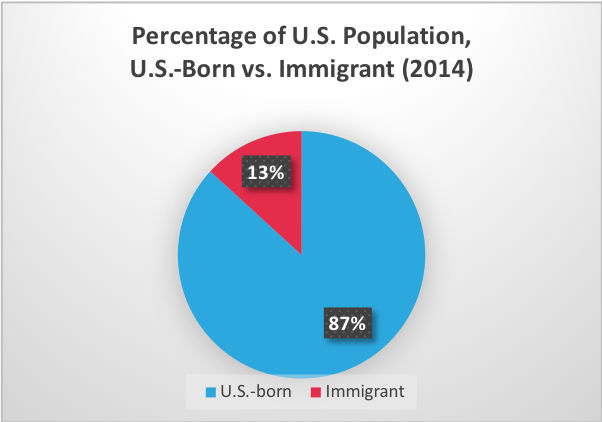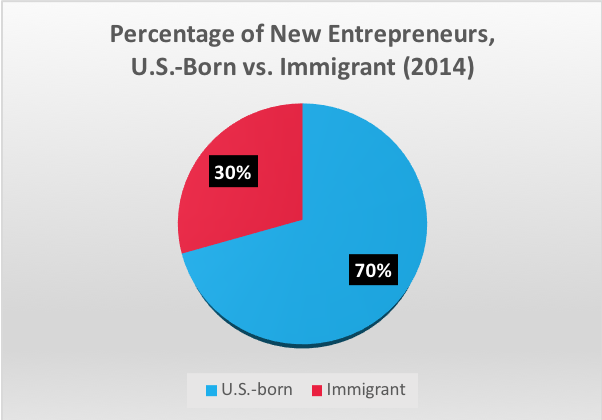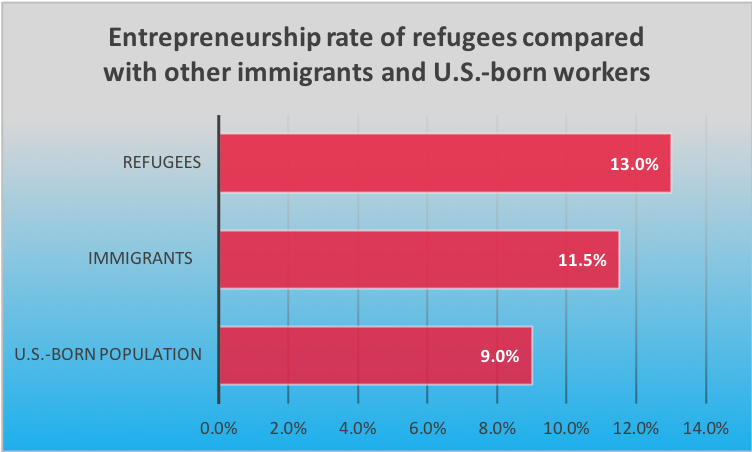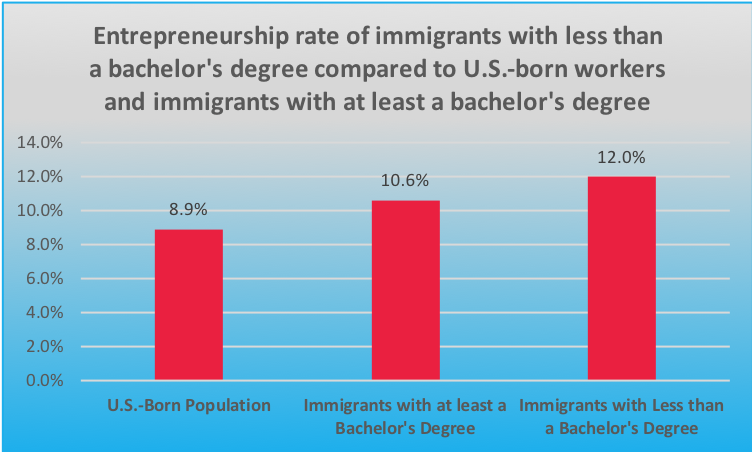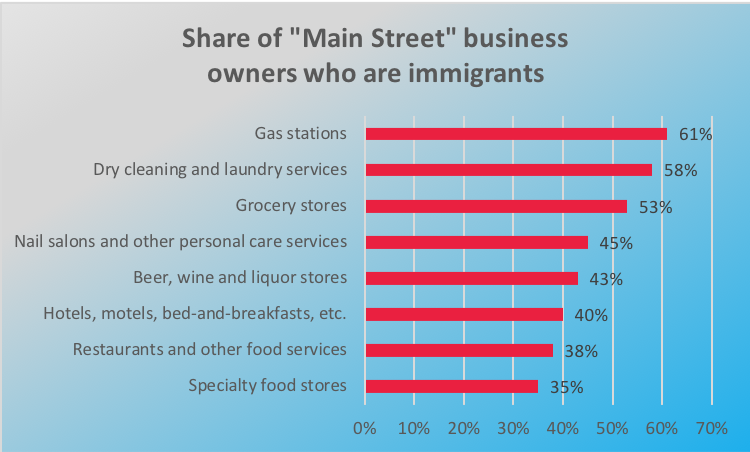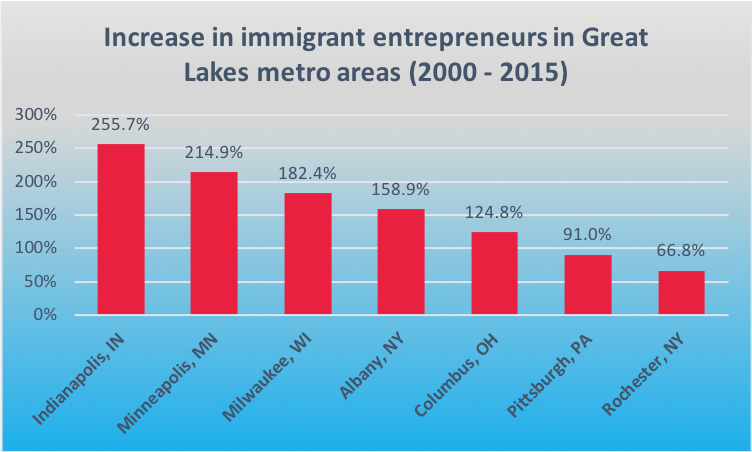Immigrants play an increasingly pivotal role in the U.S. economy. They are overrepresented in our labor force, relative to their share of the population, but they also have a higher propensity to launch businesses, compared to those born in the United States. This fact sheet is the fourth of a seven-part series examining the various roles immigrants play in our economy. It highlights research illuminating the role of immigrant entrepreneurs in starting businesses, creating jobs and revitalizing communities.
Immigrants start businesses at a higher rate than the U.S.-born
Immigrants are more likely to start businesses
Immigrants have founded 51 percent of the country’s startup companies worth $1 billion or more as of Jan. 1, 2015, a study conducted in 2016 found. Each of these companies employed an average of 760 people.
Refugees have a higher rate of entrepreneurship than other immigrants
Refugees, a subgroup of the foreign-born population, have a particularly high rate of entrepreneurship. Thirteen percent of refugees are business owners, compared to 11.5 percent of non-refugee immigrants. Refugee-owned businesses generated $4.6 billion in income in 2015.
Immigrant, Asian and Latino entrepreneurs generate millions of jobs and bring in nearly a trillion dollars in revenue
In 2014, immigrant entrepreneurs in the U.S. numbered just under 2.9 million. Additionally, immigrants own 16.1 percent (860,000) of the country’s five million businesses with paid employees in 2015. These immigrant-owned businesses generated $65.5 billion in income. In 2016, 40.2 percent of firms listed in the Fortune 500 had at least one founder who was either an immigrant or the child of an immigrant. These companies employed nearly 19 million people in 2014 and generated $4.8 trillion in revenue — or one out of every seven dollars generated by U.S. businesses.
Firms owned by Asians and Latinos generated more than $1.012 trillion in 2015. They employed more than 6.7 million workers and had an annual payroll of $212 billion. Immigrant-owned businesses or businesses that are majority owned by immigrants employed nearly 4 million workers in 2007, or about one in every ten workers employed in privately held U.S. companies. The payroll for these businesses were nearly $127 billion.
Immigrants without college degrees are highly entrepreneurial
Many immigrant business owners in the United States have less than a college degree. Merit-based proposals to keep out immigrants with less than a college degree would hurt our economy by turning away potential entrepreneurs. There were an estimated 2.1 million immigrant entrepreneurs in 2015 with less than a bachelor’s degree. Almost 445,000 of those entrepreneurs owned construction businesses while another 100,000 had landscaping businesses. Immigrant business owners without college degrees brought in $43 billion in income, or about one in nine dollars generated by the U.S. self-employed population in 2015.
The rate of entrepreneurship among immigrants with less than a college degree is actually higher than that of immigrants with college degrees; 12 percent of immigrants without college degrees are entrepreneurs compared to 10.6 percent of those with college degrees. Both groups have a greater tendency to be entrepreneurs than U.S.-born workers, who make up 8.9 percent of self-employed entrepreneurs.
Immigrant businesses revive neighborhoods and spur economic development
A report, which closely examined the types of businesses immigrants tended to own by using data from 2013, found that 28 percent of “Main Street” business owners were immigrant entrepreneurs. “Main Street” businesses can be broken into three categories: Retail (such as florists, grocery stores), Accommodation and Food Services (restaurants, hotels) and Neighborhood Services (barbers, dry cleaners). These “Main Street” businesses are often the seed of economic development in an area that has been neglected. They can transform a neighborhood into a more attractive area, where people can live and work, thus sparking greater economic activity. Immigrant entrepreneurs make up more than 50 percent of business owners in some of these “Main Street” subcategories; they are 61 percent of gas station owners, 58 percent of dry cleaning owners, and 53 percent of the owners of privately held grocery stores. These small and medium-sized immigrant businesses are often undervalued when local governments are considering the best ways to revitalize their localities.
Immigrant entrepreneurs are key in revitalizing regional economies
Around the country, city and state leaders are realizing that attracting immigrant entrepreneurs is a crucial piece of an economic development strategy. A report from Global Detroit notes that “…city leaders are realizing that immigrant groups stabilize residential neighborhoods and commercial retail corridors that are critical to the quality of life.” Immigrants in Michigan were nearly three times more likely to start businesses between 1996 and 2007 than were native-born residents. Detroit leaders have launched several initiatives to attract and retain immigrants and promote immigrant entrepreneurship.
Not only major cities seek to attract immigrant entrepreneurs to revitalize neighborhoods. For example, small towns in Iowa are working with Iowa State University to promote immigrant entrepreneurship and integration as part of their economic development strategy.
While immigrants make up a smaller percentage of the population in the Great Lakes Region than in some other regions, they play an outsized role in business creation. In 2015, nearly 1 in 10 immigrants (9.5 percent) in the region were self-employed, and those immigrant entrepreneurs generated $7.1 billion in business income. Between 2000 and 2015, about half of the 25 largest metro areas in the region saw an increase in immigrant entrepreneurship of 100 percent or more.
Conclusion
Immigrants are playing an increasingly important role in business creation in the U.S. They have a greater propensity to start businesses than the U.S.-born population. Refugees are even more entrepreneurial, as are immigrants without a college degree.
Immigrant businesses create millions of jobs
Businesses started by immigrant entrepreneurs create millions of jobs and generate billions of dollars in revenue. Immigrant entrepreneurs are not only providing for themselves and their families, but are helping revitalize neighborhoods, cities and regions that have seen economic decline. It is no wonder that local leaders across the country are attempting to figure out how they can attract immigrants to their areas and promote immigrant entrepreneurship that will benefit everyone in the community.
*Special thanks to Maurice Belanger for his contributions to this series.
To see all papers in the Immigrants as Economic Contributors series, click here.
Immigrants-as-Economic-Contributors-Immigrant-Entrepreneurs PDF
Author: Dan Kosten




